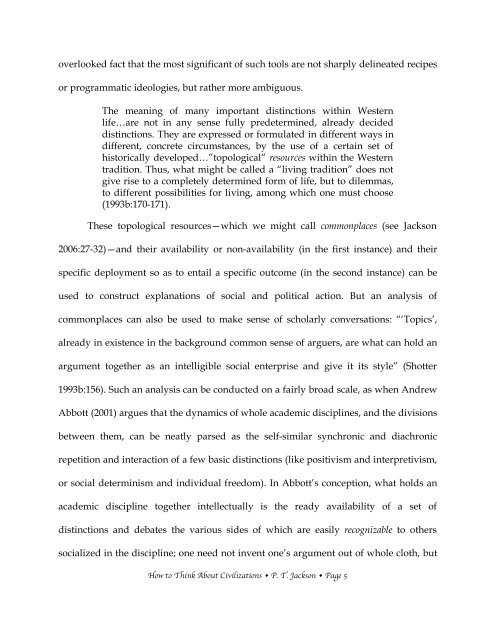How to Think About Civilizations - The Watson Institute for ...
How to Think About Civilizations - The Watson Institute for ...
How to Think About Civilizations - The Watson Institute for ...
Create successful ePaper yourself
Turn your PDF publications into a flip-book with our unique Google optimized e-Paper software.
overlooked fact that the most significant of such <strong>to</strong>ols are not sharply delineated recipes<br />
or programmatic ideologies, but rather more ambiguous.<br />
<strong>The</strong> meaning of many important distinctions within Western<br />
life…are not in any sense fully predetermined, already decided<br />
distinctions. <strong>The</strong>y are expressed or <strong>for</strong>mulated in different ways in<br />
different, concrete circumstances, by the use of a certain set of<br />
his<strong>to</strong>rically developed…”<strong>to</strong>pological” resources within the Western<br />
tradition. Thus, what might be called a “living tradition” does not<br />
give rise <strong>to</strong> a completely determined <strong>for</strong>m of life, but <strong>to</strong> dilemmas,<br />
<strong>to</strong> different possibilities <strong>for</strong> living, among which one must choose<br />
(1993b:170-171).<br />
<strong>The</strong>se <strong>to</strong>pological resources—which we might call commonplaces (see Jackson<br />
2006:27-32)—and their availability or non-availability (in the first instance) and their<br />
specific deployment so as <strong>to</strong> entail a specific outcome (in the second instance) can be<br />
used <strong>to</strong> construct explanations of social and political action. But an analysis of<br />
commonplaces can also be used <strong>to</strong> make sense of scholarly conversations: “‘Topics’,<br />
already in existence in the background common sense of arguers, are what can hold an<br />
argument <strong>to</strong>gether as an intelligible social enterprise and give it its style” (Shotter<br />
1993b:156). Such an analysis can be conducted on a fairly broad scale, as when Andrew<br />
Abbott (2001) argues that the dynamics of whole academic disciplines, and the divisions<br />
between them, can be neatly parsed as the self-similar synchronic and diachronic<br />
repetition and interaction of a few basic distinctions (like positivism and interpretivism,<br />
or social determinism and individual freedom). In Abbott’s conception, what holds an<br />
academic discipline <strong>to</strong>gether intellectually is the ready availability of a set of<br />
distinctions and debates the various sides of which are easily recognizable <strong>to</strong> others<br />
socialized in the discipline; one need not invent one’s argument out of whole cloth, but<br />
<strong>How</strong> <strong>to</strong> <strong>Think</strong> <strong>About</strong> <strong>Civilizations</strong> • P. T. Jackson • Page 5
















